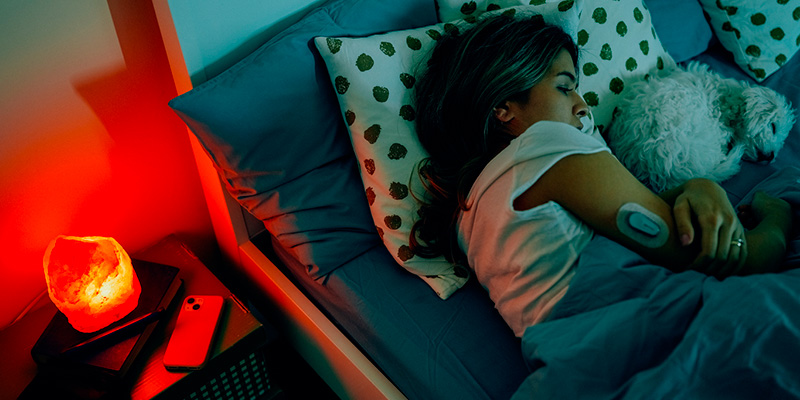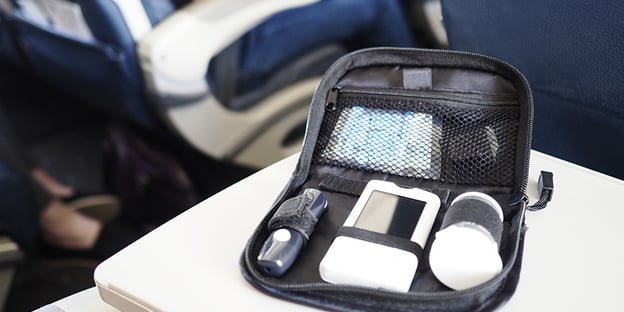If you’re keeping an eye on your health, you know to eat right, watch your blood sugar levels, and get enough exercise. But there’s another ingredient in managing your diabetes you might not even think about. The hours you’re asleep might be just as important as the ones you spend at the gym or taking insulin. Lack of sleep and diabetes can be a dangerous combination.
Here’s a breakdown of sleep and diabetes and how they impact each other.
Benefits of Sleep
Sleep isn’t just a time to rest. It’s actually more like your brain’s self-cleaning system, according to the National Institute of Health. Your brain and body use the time to clean out toxins; repair everything from your blood vessels to your immune system; and prepare your brain to learn, remember, and create.
Enough quality sleep can improve your mood, health, and overall brain performance. But if you’re regularly not getting enough sleep, your risk of diseases — including stroke, heart disease, obesity, and dementia — increases.
How Much Sleep Do You Need?
So how much sleep is enough? It depends on your age. Experts recommend at least seven hours per night for adults, with elementary school-aged children needing about nine and teens needing up to 10.
But it’s not just the hours you spend in bed that matter. The quality of your sleep is just as important as the duration. Are you tossing and turning? Are you waking up frequently throughout the night? Interrupted sleep can increase your levels of the stress hormone cortisol, which can make getting back to sleep even more difficult.
How Does Sleep Impact Diabetes
Elevated cortisol can also affect your diabetes. When your levels are high, you may need more insulin than normal. And lack of sleep can also affect your diabetes management in the following ways:
- Increases insulin resistance
- Increases your appetite
- Makes you feel less full after eating
- Makes you crave foods higher in carbs and sugar
- Makes it harder to lose weight
- Raises blood pressure
- Increases your risk of a heart attack
- Makes your immune system less able to fight infections
- Increases your risk of depression and anxiety
But getting enough sleep can have positive effects on your diabetes management, including:
- Increased time in your target range the following day
- Less insulin needed the next day
- More energy
- Improved mood
- Better willpower to resist foods that make controlling your blood sugar more difficult
- Less soreness after exercise
And diabetes can also affect sleep. If your blood glucose levels dip or spike regularly during the night, your continuous glucose monitor (CGM) will alert each time, waking you up. In addition to resulting in increased cortisol levels, these interruptions can leave you feeling exhausted and irritable for work the next day. This is one symptom of Diabetes Distress, a term coined by diabetes researchers to explain the emotional effects of diabetes. And over time, poor sleep can lead to changes in your serotonin levels, the hormone associated with feelings of happiness.
But these sleep interruptions might not just affect you. Your CGM alerts can wake up your spouse, and your frequent trips to have a snack or take insulin may wake up your children, your caregiver, or other members of your household. Now, the whole family is in for a miserable day at school or work, thanks to those alerts.
And CGM alerts aren’t the only thing that can interrupt your sleep. Patients with diabetes can also experience sleep interruptions caused by:
- Alarms to check your levels. Patients who don’t have CGMs have to manually check their glucose levels. Some trust alarms to wake them up to perform these readings, which may need to be done during the night.
- If your levels are too low or too high, you may need to take insulin or have a snack to correct them. Getting up to do so can make it harder to fall back to sleep.
- Insulin pump alarms. Some insulin pumps may also have alarms that can alert you to low insulin levels or low batteries.
- Increased thirst. Increased glucose levels can leave you feeling thirsty, meaning you may need to get up to get a drink of water.
- Trips to the bathroom. All that nighttime water drinking can mean increased trips to the restroom during the night.
Getting Better Sleep With Diabetes
So how can you break the cycle of poor sleep and increased insulin? Start by talking to your doctor or diabetes educator. They may suggest setting a slightly higher target glucose during the night to reduce the chance of CGM alerts waking you. Some diabetes patients report that using CGMs this way helps them sleep through the night for the first time in years.
Your care team will also work with you to create a plan for managing your blood glucose levels during the night. If your sugar levels tend to run low in your sleep, for example, your care team might decide on a routine of reading your levels and having a protein-heavy snack, like beef jerky, before bed. This can help reduce the risk of hypoglycemic events during the night, so you can sleep without CGM interruptions.
But sometimes, your problem might not be staying asleep without interruptions. It might be getting to sleep in the first place. In that case, you might try some of these techniques.
- Find a routine. Going to bed at the same time every night and waking up at the same time every morning could help increase your overall quality of sleep. Some people use alarms to let them know when it’s time to get ready for bed. Others trust the same series of events — like taking a hot bath, brushing their teeth, and reading a chapter in a book — to lull them to sleep. Try a few things, discuss the issue with your health care team, and find what works for you.
- Get a buddy. If you’ve ever tried to stop smoking or start exercising, you know a buddy can help keep you accountable. The same is true for sleep. Ask your spouse or roommate to help you stick to a bedtime. If you tell them you want to be in bed by 10 p.m. and they see you watching a movie at 10:30 p.m., they should remind you of your sleep goals and the habits you need to reach them.
- Avoid too much caffeine. Limit caffeine and try to avoid it during the afternoon and evening. It can affect your body up to eight hours after you ingest it.
- Create a welcoming sleep environment. Make sure your room is dark, quiet, relaxing, and cool. Some experts recommend keeping it around 65 degrees to promote sleep.
- Remove distractions. Radios, televisions, and computer screens can all affect your sleep. Consider avoiding them for several hours before bedtime.
- Get active. Physical activity during the day can help you feel tired when it’s time for bed.
- Use a sleep tracker. Usually worn on the wrist, fitness trackers can give you important information about your sleep habits. If you and your care team see that staying up too late or drinking caffeine too late in the day translates into trouble falling asleep, they can help you strive for healthier habits that help you sleep better.
Ready to get a CGM and experience better sleep? Here are the steps to take to advocate for a CGM:
- Print the CGM Fact Sheet.
- Take the CGM Fact Sheet to your next doctor’s appointment.
- Point out which CGM will work best for your unique needs.
- Ask your doctor for a prescription.
It’s that easy!
A CGM can be life-changing for patients with diabetes because it’s an easier, more comprehensive, and more convenient way to manage your health and improve your quality of life.








